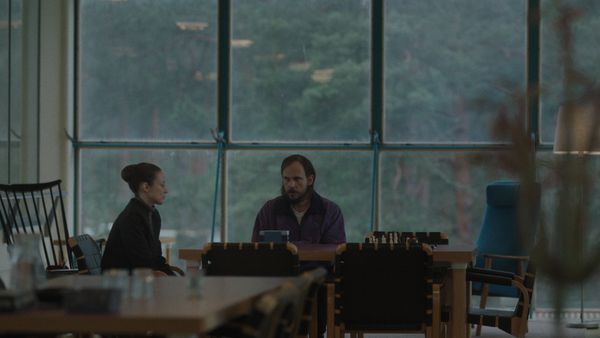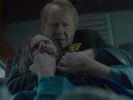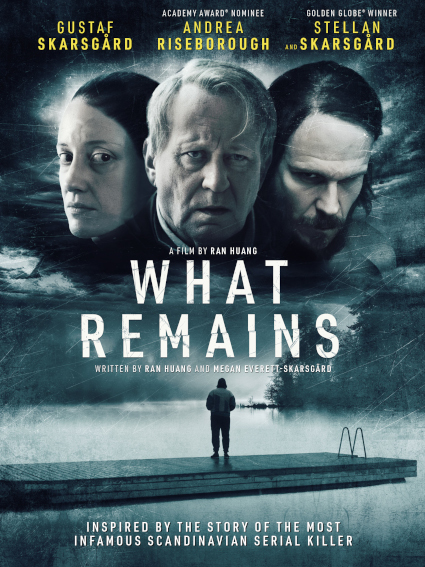Eye For Film >> Movies >> What Remains (2022) Film Review
What Remains
Reviewed by: Jennie Kermode

In crime fiction, the number one goal of many a detective, whether amateur or professional, is to elicit a confession. It’s seen as the gold standard whereby guilt can be confirmed and cases closed. In reality, however, things are a little different. False confessions happen all too easily, especially where vulnerable individuals are involved. The risk of miscarriages of justice is even higher when you factor in the pressures on police and prosecutors to produce apparent solutions, with politicians, the media, and victims and their families all playing a part. Although Ran Huang’s film is fiction, it has its roots in a real case riddled with doubt.
When we first encounter Sigge (Gustaf Skarsgård), he’s getting an uncomfortable taste of the world beyond the doors of the secure unit where he has been spending his days. Because he has been doing well, he’s been allowed day release for his birthday, but he’s robbed before he can spend any money, and a visit to his brother goes badly. When he returns, a guard sees him looking down and reminds him that he’ll be getting out soon. “I like it here,” says Sigge simply. It’s a not uncommon sentiment amongst vulnerable people who have spent long periods in incarceration. Is it the motive for what Sigge does next? Perhaps – but whatever the truth may be, it’s complicated.

It begins with a startling confession to a fellow inmate. Then there are sessions with therapist Anna (Andrea Riseborough), who, in turn, brings in detective Soren (played by Stellan Skarsgård, Gustaf’s father). Anna is concerned about Sigge’s wellbeing, especially as it seems that he was abused as a child, which she believes may have set him on course to harm others. She becomes quietly obsessed not just with finding out more about the murders he claims to have committed, but with persuading him to confront childhood memories which she believes are the key to his overall condition. Soren just sees a man who claims to have murdered children, and wants to get the details out of him any way he can. over timed, however, their positions will gradually change, with Soren coming to understand how damaged Sigge is, whilst Anna gradually realises that she may have contributed to damaging him.
I use the name Sigge here because it’s the name the character goes by at the end of the film (as well as his birth name) – like his real life counterpart, he changes it in the interim, something which might itself be interpreted as indicative of an unsettled identity. Generally calm and soft-spoken, perhaps due to treatment with benzodiazepine, he has poor impulse control – small things can lead to sudden outbursts of aggression – which make it entirely conceivable that he could have killed, but also cause him a lot of guilt in themselves, gradually leading him to wonder if the intent and emotional capacity to do harm are not as egregious in themselves as actually carrying it out, their difference from action largely being a matter of circumstance and opportunity. Yet this in itself could be an excuse of sorts.
Whilst Anna tells others that it’s natural that he might not explicitly recall everything he’s done, we are left to wonder if this is true in his case. Has he made the whole thing up? If he genuinely has a mental, is he struggling against it or is he consciously reinforcing it? His brother expresses shock at an allegation about a family member. He has biases of his own, of course, and it’s possible that he’s pushing back uncomfortable memories, but Anna’s morally-inspired commitment to believing any claim of abuse gradually comes to seem naïve. There’s a lot of stake here. She could be being consciously or unconsciously manipulated; she could also be feeding a delusion with her leading questions.
All of this psychological complexity plays out between the three central characters over the course of several years, during which Soren has to deal with internal politics in his department and Anna undergoes repeated cycles of fertility treatment. It’s gently suggested to her that she doesn’t know when to stop trying. Christopher Blauvelt’s low key cinematography, the perpetually grey skies and neutral coloured sets create a seemingly unchanging world, evoking the bruised peace of the asylum, far from the sensation that the real case created. There is criticism of the aggressive techniques used in another institution where Sigge is temporarily held, and we get a glimpse of a distraught mother convinced that he’s responsible for the disappearance of her son, but most of the film’s power comes from its weight of stillness.
This approach has already angered some viewers who expect the crime genre to be dynamic and thrilling, but it’s not that it has tried and failed to achieve this – it’s doing things differently for a reason. Its slow, observational style allows us to get much closer to the key figures and explore aspects of motive which are commonly lost. It invites us to think about Anna’s technique, about the changes in Soren’s understanding, and to find mystery not in the search for evidence but in Sigge’s mind, which he may not fully understand himself. If you pay attention, it will leave you wondering about your own.
Reviewed on: 04 Jul 2024
















